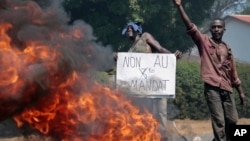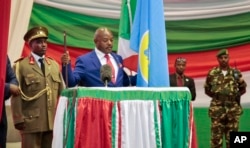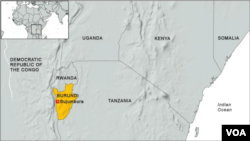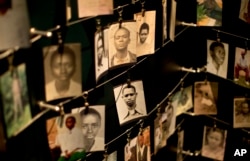Lionel fled Burundi last month after a tip off from a friendly police officer that he was on a "list," which opponents of President Pierre Nkurunziza say the intelligence service compiles of people who are often arrested and sometimes killed.
Lionel had attended protests and had spoken out against the government online, but he believes being a member of the Tutsi ethnic minority had put people like him more at risk of being targets.
"The government has tried to turn this into an ethnic problem," he told Reuters, from the Rwandan capital of Kigali.
Eight months into a crisis that erupted when Nkurunziza announced he would run for a third term his opponents say is illegal, Burundi has been suffering from a worsening wave of violence. At least 400 people have been killed and 200,000, like Lionel, have fled the country.
The authorities deny carrying out arbitrary arrests or killings. They say there is no "list" of government opponents and no ethnic component to the unrest. Such charges are "fabrications" stirred up to discredit them, they say.
In a public phone-in last month, Nkurunziza said: "Burundi has neither political nor ethnic problems. It rather has insecurity problems."
But increasingly, opposition figures openly say the authorities are disproportionately targeting Tutsis in their security crackdown — an ominous accusation in a country where an ethnic-fueled civil war ended just a decade ago and in a region still scarred by the 1994 genocide in neighboring Rwanda.
Issa Ngendakumana, a member of the Hutu ethnic majority and spokesman of the opposition FRODEBU Nyakuri party, said: "The tendency is clear ... Those who are mostly worried by arbitrary arrests are most often Tutsi, although even Hutus are not spared."
Rwanda and Burundi are nearly twins, with an almost identical population mix of roughly 85 percent Hutus and 15 percent Tutsis.
In both countries, the two groups share Africa's most densely-populated agricultural land, amid the bountifully fertile soil of mist-shrouded hills. Both countries have endured recent histories of ethnic violence.
In Rwanda, the killing burned fast: a Hutu-controlled government and allied militias killed 800,000 people in 100 days in an attempt to exterminate the Tutsis in 1994. In Burundi, it burned slower: a 12-year civil war between a mainly Tutsi controlled-army and Hutu rebels had killed 300,000 people by the time it ended with a power-sharing peace deal in 2005.
Today, Rwanda is still controlled by the Tutsi leader who led the rebel force that ended the genocide two decades ago, while Burundi is led by Nkurunziza, a former leader of a Hutu rebel group during the civil war, who took office under the peace accord.
Political, not ethnic, fight
The government in Burundi's lakeside capital Bujumbura says there is no risk of return to the ethnic bloodletting of the past. Under the 2005 peace deal, 40 percent of government jobs are reserved for Tutsis, while the army is split 50-50.
Opposition parties, too, are mainly ethnically mixed and emphasize that their quarrel with the authorities is political rather than ethnic.
For now, the battle lines in the crisis have still mainly followed political, rather than ethnic, allegiances.
Opposition figures — Hutus as well as Tutsis — say the president's third term violates the constitution and the 2005 peace deal. Loyalists cite a court ruling saying he could run.
A foiled coup attempt in May was led by a Hutu commander who had been close to Nkurunziza.
"I would be more worried about certain branches of the security sector being instrumentalized by the state than the general population being engaged in ethnic violence," said Yolande Bouka, from Nairobi's Institute for Security Studies.
But the ethnic wounds of the civil war are still so fresh that many Burundians feel they could be torn open again.
The United States has condemned "incendiary language" by the government that incited division and violence.
Bujumbura officials deny using goading speech: "There is no provocative language nor ethnic move from the government," said Willy Nyamitwe, presidential media adviser.
But the opposition has noted what it describes as ominous examples.
In October, the senate president, Reverien Ndikuriyo, a Hutu, told local officials there could be a time when people were given "the authorization to 'work.' " The word he used — "gukora" in the local Kirundi language — was the same word used by Rwandan Hutu extremists to promote genocide.
After his comments provoked public criticism, he later said his remarks were misrepresented and he had been referring to employment in a job. Opponents dismissed the explanation.
‘Where is Kagame to save you?’
So far, outside efforts to intervene to halt the violence have been thoroughly rejected by Bujumbura, which has shrugged off Western sanctions and aid cuts, and dismissed a plan for African peacekeepers as an "invasion." Regionally-backed peace talks have stumbled.
Foreign governments say they are frustrated by Burundi's hostility to mediation efforts: "It is quite unusual for a country like this, that is reliant on donor funding, to be completely bloody minded," said a senior Western diplomat.
"Really hard bush fighters" increasingly hold sway in the ruling party and government, the diplomat said.
One worry is that ethnic violence, if unleashed, could spill across borders. Rwandan President Paul Kagame, a Tutsi whose rebel force halted the slaughter there, has in the past sent forces into neighboring Democratic Republic of Congo to pursue Hutu "genocidaires" behind the killing in Rwanda.
Foreign powers believe Rwanda could do the same in Burundi if Tutsis become a target again.
"If there is slaughter on the streets, they are not going to stand by," said one Western envoy to Rwanda.
Claude, 33, a Tutsi from Bujumbura's Nyakabiga district who did not want his name used in full for fear of reprisals, described police raids there after rebels attacked army camps in the capital on Dec. 11. The government said the violence killed nearly 90 people.
The police who swooped into the district — a hotbed of anti-government protest with a large Tutsi population — mentioned the Rwandan leader.
"We heard cops saying, 'Where is Kagame to save you?' " Claude said.








